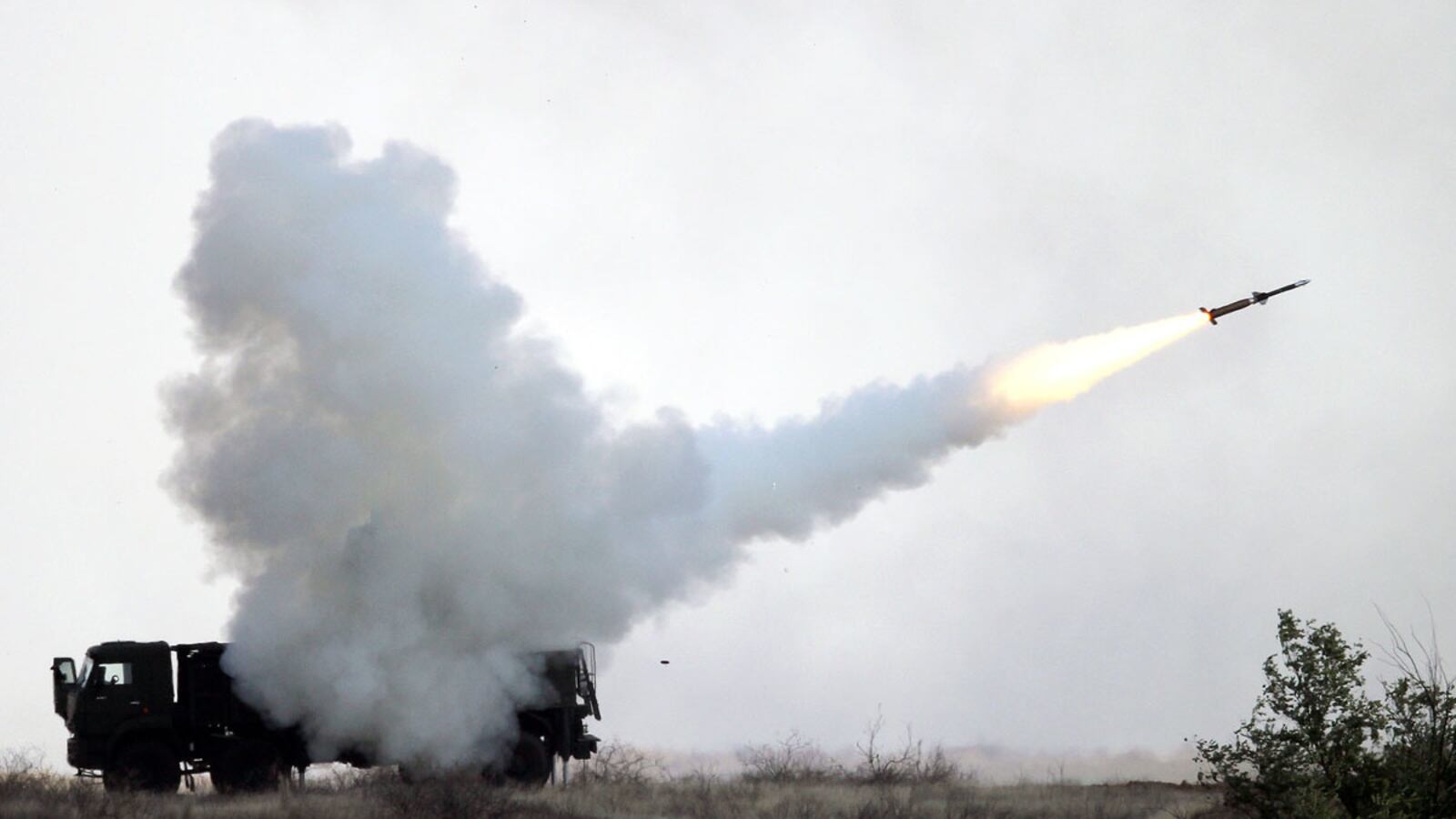A Turkish plane downed by Syrian fire over the Mediterranean 10 days ago was almost certainly hit by a Russian-supplied rocket fired by Russian-trained technicians, diplomatic sources in Ankara and London told The Daily Beast on Sunday. The Turkish Air Force F-4E Phantom II disappeared from radar screens at 11:58 a.m. June 22. Syria’s Foreign Ministry later admitted that its forces had downed the plane after it violated Syrian airspace.

“The evidence indicates that [the Turkish plane] was hit by a Russian-made Pantsir,” a Western diplomat with knowledge of the ongoing NATO investigation into the shooting told The Daily Beast. Russia supplied Syria with 36 mobile Pantsir-S1 surface-to-air missile launchers in 2007 at a cost of $900 million. “At a range of 13 nautical miles, it’s the only kit the Syrians have with the range, response time, and accuracy” to have downed the American-made F-4, the diplomat said.
Soviet-era weaponry—mostly RPG-7 rocket-propelled grenades—has been used to down many U.S. helicopters in Afghanistan and Iraq in recent years, and a U.S. F-117 stealth bomber was shot down over Yugoslavia in 1999 by a 1980s-era Soviet missile. But if confirmed, the downing of the F-4 by a Pantsir will be the first time an American jet has been shot down by modern Russian antiaircraft technology.
The Pantsir system—also known by its NATO name, the SA-22 Greyhound—was sold to the Syrians with a contract for Russian-supplied technicians to install the system and train its local operators. Britain’s Sunday Times reported Sunday that Russians are still stationed at the missile battery control centers, raising the possibility that Russian personnel could have been directly involved in the June 22 incident. “We would not be surprised if these Russian experts, if they didn’t push the button, at least were beside the Syrian officers who did it,” an Israeli Air Force source told The Sunday Times.
Details of Russian involvement in the shooting of the Turkish plane came as Moscow once again blocked international efforts to agree on a blueprint for Syrian President Bashir al-Assad to relinquish power Saturday. United Nations special envoy Kofi Annan had convened an international crisis meeting in Geneva, Switzerland, on Saturday to agree on a blueprint for a transitional Syrian government. U.S. Secretary of State Hillary Clinton traveled to St. Petersburg last Thursday in a last-ditch attempt to persuade Russian Foreign Minister Sergey Lavrov to agree that Assad and his allies had no place in the transitional process.
Clinton’s effort failed. Russia agreed to a communiqué calling for “clear and irreversible steps” toward a negotiated settlement—but adamantly blocked U.S. and U.K. attempts to exclude Assad and senior Syrian Baath Party officials from a future government. The final statement stuck to Moscow “red line” that, in Lavrov’s words, “only the Syrian people can decide the transition process … It must not be imposed from outside.”
Russia and China have firmly opposed any U.N. resolution that could be interpreted as a green light for Western military intervention in Syria after a weakly worded resolution was used as a mandate to bomb Libya. Lavrov is adamant that the same will not happen again. “When deciding to support U.N. Security Council Resolutions [on Libya], we believed that these decisions would help limit the excessive use of force and pave the way for a political settlement,” Lavrov wrote last month. “Unfortunately, the actions undertaken by NATO countries under these resolutions led to their grave violation and support for one of the parties to the civil war, with the goal of ousting the existing regime, damaging in the process the authority of the Security Council.”
Western diplomats have been trying to persuade the Russians that the Assad regime is doomed and that continuing to support it will damage Russia’s long-term interests in Syria after Assad’s eventual fall, according to one Western official not authorized to speak on the record. “If they want to keep [the Russian naval base at] Tartus, if they want to sell arms to the new regime, they need to start distancing themselves from the current one,” said the official, who has a dealt with Syria-related issues for over a decade. “Russia wants to stay in the sphere-of-influence game, and they do that by extending their international diplomatic leverage to protect their friends. But when those friends, like Gaddafi, [fall], they end up worse off than before.”
Despite Russian stonewalling Saturday’s talks did yield some results. “This is the first time that the P5 [permanent members of the U.N. Security Council] and other key players have spelled out in detail what transition should look like,” British Foreign Secretary William Hague told reporters Saturday. “That is a step forward and is worth having.”






